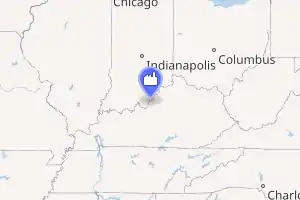R. Gallagher Generating Station
The R. Gallagher Generating Station is a four-unit coal-burning power plant located along the Ohio River some two miles (3 km) downstream from New Albany, Indiana in southernmost Floyd County, Indiana. The total aggregate capacity (year-around) of the plant's four identical units is 560MW. Unit 2 began operating in 1958; unit 1 in 1959; unit 3 in 1960 and unit 4 in 1961. In early 2012, both Units 1 and 3 were retired.[1] Units 2 and 4 continue to operate because Duke Energy installed baghouses, greatly reducing the pollution and meeting the current standards set by the EPA. The plant's current output is 280 megawatts (each unit is rated at 140 megawatts). The plant is connected to the grid by 138 and 230 kilovolt transmission lines.[2]
| R. Gallagher Generating Station | |
|---|---|

| |
| Country | United States |
| Location | New Albany, Indiana |
| Coordinates | 38°15′49″N 85°50′16″W |
| Status | Operational |
| Commission date | Unit 1: June 1959 Unit 2: December 1958 Unit 3: April 1960 Unit 4: March 1961 |
| Decommission date | Unit 1: 2012 Unit 3: 2012 |
| Owner(s) | Duke Energy |
| Thermal power station | |
| Primary fuel | Bituminous coal |
| Turbine technology | Steam turbine |
| Cooling source | Ohio River |
| Power generation | |
| Nameplate capacity | 280 MWe |
Environmental impact
Sulphur dioxide emissions
As of 2006, R. Gallagher was the dirtiest major power station in the US in terms of sulphur dioxide gas emission rate: it discharged 40.38 pounds (18.32 kg) of SO2 for each MWh of electric power produced that year (50,819 tons of SO2 per year in total).[3]
References
- "Gallagher-station". Duke Energy Corporation. Retrieved 2018-03-05.
- "Existing Electric Generating Units in the United States, 2006" (Excel). Energy Information Administration, U.S. Department of Energy. 2006. Retrieved 2008-07-14.
- "Dirty Kilowatts 2007 Report Database". Environmental Integrity Project. Retrieved May 2008. Check date values in:
|accessdate=(help)